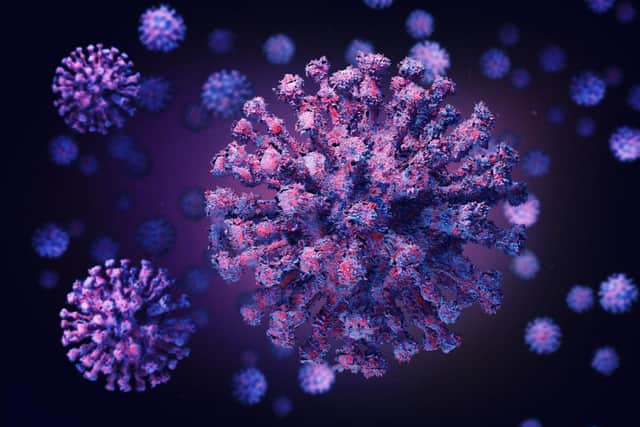New Covid strain UK: what are the common symptoms of the coronavirus variant - and will the vaccines still work?
A new strain of Covid-19 was indentified in the UK just before Christmas.
Since then, it has spread through the country and has led to an exponential rise in cases.
Advertisement
Hide AdAdvertisement
Hide AdThe new variant is one of the reasons a fresh lockdown was imposed in both Scotland and England at the beginning of January.


And Boris Johnson announced on 22 January that this variant could be more deadly than the original version of the virus.
It comes as the UK recently passed another grim milestone, recording more than 100,000 Covid-19 related deaths, according to official figures.
Here’s everything you need to know about the new strain - and whether you should be worried about it.
Where did the variant come from?
Matt Hancock told MPs on Monday 14 December that a new variant of Covid-19 had been identified, and that it was spreading in some areas of the country.
The new strain, called VUI – 202012/01, was first detected in September in Kent, and in November around a quarter of coronavirus cases in London were the variant.
It quickly spread across the south east of England, leading to more than 50 countries stopping flights to or from Britain to prevent the spread.
It was first detected back in October, by the Covid-19 Genomics UK Consortium (Cog-UK).
Advertisement
Hide AdAdvertisement
Hide AdThe new strain was found in two samples, collected from Kent in London, on September 20 and 21.
Virologists suspect that the multiple mutations happened in a patient with a severely suppressed immune system, who may have had the virus for weeks and then infected someone else.
Is it more transmissible?
The new strain has spread quickly through the UK since it first emerged.
As it has spread so fast, scientists believe it could be up to 70 per cent more transmissible than other variants.
That was also the figure Boris Johnson referred to when speaking about the new strain - and he said that could increase the R number, the infection rate, by at least 0.4.
However Professor Neil Ferguson, speaking at a Q&A with members of the New and Emerging Respiratory Virus Threats Advisory Group (Nervtag), said there is strong evidence that the new strain is 50 per cent more transmissible than the original variant.
Can it infect children more easily?
The new variant could infect children more easily, said Professor Neil Ferguson, a member of the government’s New and Emerging Respiratory Virus Threats advisory group (NervTag).
He said there is a “hint” that the virus has a “higher propensity” to infect children, according to the latest data.
Advertisement
Hide AdAdvertisement
Hide AdProf Ferguson explained: “What we've seen over the course of a five or six-week period is consistently the proportion of pillar two cases for the variant in under-15s was statistically significantly higher than the non-variant virus."
However, he warned that more data would be needed before a conclusion could be made.
Can a test detect the new strain?
Standard PCR Covid-19 swab tests - which are widely used at testing centres across the UK - are able to detect the new virus variant, England's Chief Medical Officer, Professor Chris Whitty, said.
Can it cause more serious symptoms?
A new study has revealed the symptoms of the variant for the first time, and they differ to those caused by the original version.
ONS Research carried out in England has reported that a cough, fatigue, muscle pain and sore throat may be more common in people who test positive for the new UK Covid variant.
The research was conducted on a random sample of 6,000 people, who reported that loss of taste and smell was a less common symptom of the new variant.
In the group of approximately 3,500 people with the new variant:
- 35% said they had a cough
- 32% had fatigue
- 25% had muscle aches and pains
- 21.8% had a sore throat
- Around 15% had a reduction in sense of taste and smell
In a group of 2,500 people with the old variant:
- 28% had a cough
- 29% had fatigue
- 21% had muscles aches and pains
- 19% had a sore throat
- 18% had a loss in both taste and smell.
How deadly is the new strain?
In a press briefing at Downing Street, the prime minister reported that the new variant could be considerably more deadly than the original version of Covid-19.
Advertisement
Hide AdAdvertisement
Hide AdMr Johnson said: "In addition to spreading more quickly, it also now appears that there is some evidence that the new variant - the variant that was first identified in London and the south east - may be associated with a higher degree of mortality.
"It's largely the impact of this new variant that means the NHS is under such intense pressure."
Early studies suggested that the new variant could be around 30 percent more fatal than the initial strain.
The old variant has a fatality rate of around 10 in 1000, while the new variant has a slightly more deadly rate of 13 or 14 in 1,000.
Will it respond to a vaccine?
There were fears that the vaccines would not work against the new strain.
However, Boris Johnson confirmed that all three UK-approved vaccines should work to immunise against the new variant.
The prime minister said research “continues to show that both the vaccines we're using remain effective both against the old variant and this new variant,” referring to the Pfizer-BioNTech and Oxford-AstraZeneca vaccines currently being given out in the UK.
Moderna, the third approved vaccine which is not available until spring, has also concluded that its vaccine will work against the UK variant.
Advertisement
Hide AdAdvertisement
Hide AdThe vaccines invented by Pfizer, Moderna and Oxford all train the immune system to attack the spike protein of the virus - which is where the mutation has been found.
Yet, the human body learns to fight off multiple parts of the spike, which is why health experts have said the vaccine will still work against the new strain.
When lots of people have been given the jab, the virus will have to mutate again in order to try and infect those people who have been immunised.
A regularly-evolving virus could lead to multiple updates of the vaccine - just like what happens with the flu jab.
What is a mutation?
A mutation is a change in a virus’s genome, which is the set of genetic instructions that house all the information the virus needs to function.
Mutations happen when the virus makes contact with a host and starts to replicate.
The set of instructions is then copied, but mistakes can often happen in the process.
Where the errors occur within the genome will determine whether they have a positive or negative impact on the virus’s ability to survive or replicate.
Advertisement
Hide AdAdvertisement
Hide AdSARS-CoV-2 is a RNA virus, which is more prone to mutations, unlike DNA viruses, like smallpox.
As it has passed from person to person over the past few months, Covid-19 has been, and continues to be, mutating.
